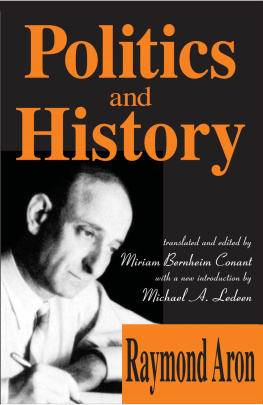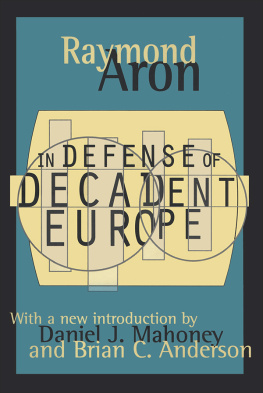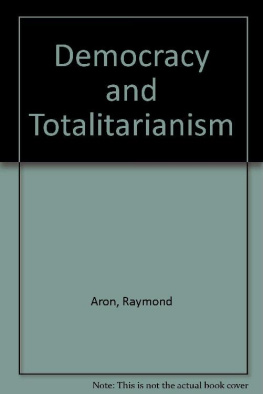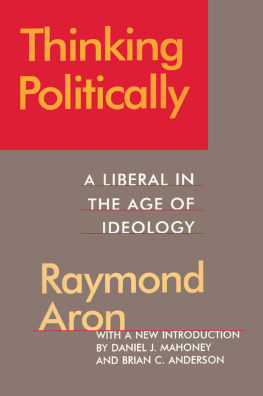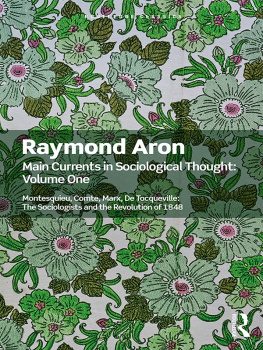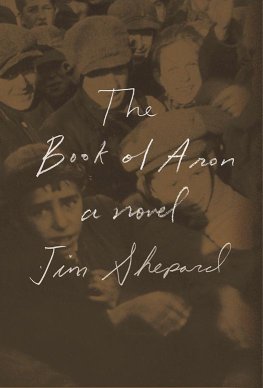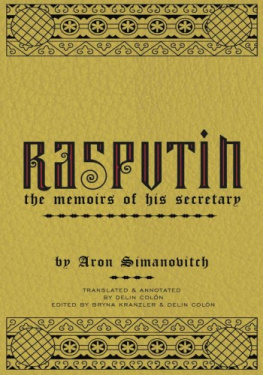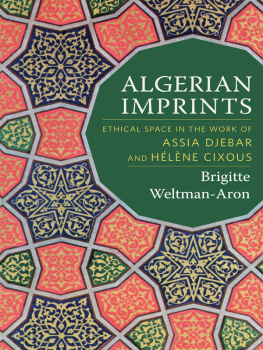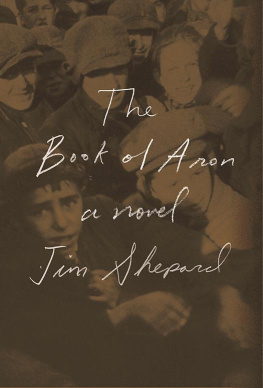Politics
and
History
Originally published in 1978 by The Free Press, a Division of Macmillan Publishing Co., Inc.
Published 1984 by Transaction Publishers
Published 2017 by Routledge
2 Park Square, Milton Park, Abingdon, Oxon OX14 4RN
711 Third Avenue, New York, NY 10017, USA
Routledge is an imprint of the Taylor & Francis Group, an informa business
Copyright 1984 by Taylor & Francis.
All rights reserved. No part of this book may be reprinted or reproduced or utilised in any form or by any electronic, mechanical, or other means, now known or hereafter invented, including photocopying and recording, or in any information storage or retrieval system, without permission in writing from the publishers.
Notice:
Product or corporate names may be trademarks or registered trademarks, and are used only for identification and explanation without intent to infringe.
Library of Congress Catalog Number: 83-15365
Library of Congress Cataloging-in-Publication Data
Aron, Raymond, 1905-
Politics and history.
Reprint. Originally published: New York: Free Press, c1978.
Includes bibliographical references and index.
1. HistoryPhilosophyAddresses, essays, lectures. 2. Political
scienceAddresses, essays, lectures. 3. Social sciencesAddresses,
essays, lectures. I. Conant, Miriam Bernheim. II. Title.
[D16.8.A725 1984] 901 83-15365
ISBN 13: 978-0-87855-944-2 (pbk)
CONTENTS
Michael A. Ledeen
Also by Raymond Aron
In Defense of Decadent Europe
Main Currents in Sociological Thought, Volume 1: Montesquieu, Comte, Marx, Tocqueville, and the Sociologists and the Revolution of 1848
Main Currents in Sociological Thought, Volume 2: Durkheim, Pareto, Weber
The Opium of the Intellectuals
Politics and History
Thinking Politically: A Liberal in the Age of Ideology
Michael A. Ledeen
RAYMOND ARON WAS THE OUTSTANDING Western intellectual of the postwar period. Unique among French political and philosophical luminaries, Aron never suspended his critical judgment nor permitted himself the psychological luxury of full, passionate participation in the mass movements of our time. For his pains, he was excluded from the salons of the stylish Parisian intelligentsia, was rarely accorded the respect and attention that his prodigious output and moral and intellectual rigor merited, and for the most part only received his just rewards abroad: in England, Germany, the United States, and Israel. It was only at the end of his life that Aron became fashionable in France, and for the past several years French literati have attempted to discover how it was that this great prophet found so little honor in his own land.
To have maintained a sense of balance and true independence of spirit during the course of the twentieth century would be a remarkable achievement in any country, but it is all the more impressive for a Frenchman, since the French fancy themselves the great creators of intellectual fashion and philosophical standards. Those who place themselves outside the conventional wisdom in France are regarded not only as intellectually inadequate, but somehow morally suspect as well. Aron was not spared such attacks, and his refusal to join the postwar hysteria of existentialism, structuralism, gauchisme (leftism), and other similarly failed visions, led to his exclusion from the progressive press. He was considered an anomaly at the Sorbonne (that he was permitted to teach there at all was frequently the object of attack from his critics), and was branded a fascist by the Communist Party, fellow-traveling intellectuals, and followers of Jean-Paul Sartre (some of whom fell into one or both of the previous categories).
But one should not exaggerate the sociointellectual travails of Raymond Aron. He lacked neither the opportunity for an enormously successful career nor access to millions of readers, and his true achievement was not so much overcoming the snobbery of his more stylish contemporaries but rather in resisting intellectual temptation. When fascism enthralled so many Europeans, Aron first rejected the revolutionary appeal, then went into exile in Great Britain, where he supported the Gaullist government in exile and reflected on the great philosophical tradition of Germany. Later, he was even able to maintain a rigorously critical objectivity toward his own hero, General de Gaulle, first when de Gaulles foreign policy led France toward a closer relationship with the Soviet Union and later when de Gaulle made remarks about the Jews that stirred Arons wrath (one of the few times in his professional life when Aron wrote with spontaneous passion).
If we are to judge political and philosophical thinkers by Nietzsches high standard according to which the mark of the educated man is his refusal to react at once to stimuli, Raymond Aron earned exceptional marks, for he always kept his distance from the hue and cry around him. His extraordinary sense of political and philosophical balance and objectivity prompted John Leonard to write in the New York Times: Raymond Aron is that ultimate inconvenience: the man who stays sober at your saturnalia and who will afterward give everybody else an intellectual hang-over.
The Politics of the Skeptical Intellectual
Like the rest of his generation, Aron was profoundly shaped by the experience of fascism and World War II, but his travails were intellectual and spiritual rather than physical. Son of well-to-do parents (his brother Adrien was able to pursue a life of bridge and tennis, to the unending envy of Raymond), Aron was never worried about money, even when he had none (at the end of the war he turned down a chair at the University of Toulouse, although no other job had been offered him). He saw the rise of national socialism in Germany first-hand, in the School of Philosophy of the University of Cologne, where he spent the years 1930-33. After a brief period in Le Havre, Aron returned to Paris in 1934 where, until the outbreak of the war, he became a professional observer of the political events of his time, a skill that subsequently became part of his ability to reconstruct historical events. Like so many outsiders, Aron strained to comprehend the principal causes of evil in the world:
I forced myself to distinguish between the reconstruction of events (as they were really lived by the actors and spectators), then to place these events within a synchronic and diachronic context, and finally the meaning of the events.
The significance, the historical sense of events changes with the unfolding of subsequent events. The historian generally inserts the interpretation into the account itself. But the distinction between the event and its consequences seems to me to be logically possible [Memoirs, 124].
Aron was trying to find a middle ground between German historicism (with its dictum to re-create the past as it really was) and French historiography (which generally insisted that the search for proper method preceded the reconstruction of events. This was particularly so in the case of writing histories of the French Revolution). He was also arguing for the ability to detach oneself from the passions of the present (saying explicitly that he would not deny the right of existence to contemporary history), an effort that would take up most of the second half of his life. This insistence on the integrity of factual reconstruction set him aside from most of his French contemporaries, for Aron demanded that analysis begin with evidence, not with theory. He recognized that every historical reconstruction entailed interpretationthe basis for the inclusion or exclusion of particular factsbut he believed it possible and indeed mandatory that the first step in historical analysis be the effort at scrupulous reconstruction of the world in which the events took place, so that one could understand the motivations of the principal actors.

